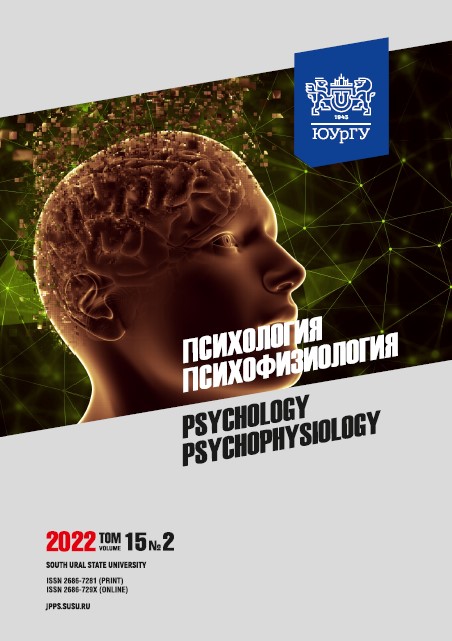Analysis of the relationship between psychophysiological parameters and psychological characteristics in university students of the Ural region
Abstract
Introduction. Modern ideas about personality and individuality suggest the existence of the relationship between physiological, psychophysiological, psychological, behavioral, and social components. The non-invasive methods of brain study are of significant importance in the assessment of physiological foundations of the individual typological characteristics of a person, especially when it comes to superslow mental processing. Such studies confirm the integral nature of mental characteristics and psychophysiological/neurodynamic foundations. Therefore, a complex psychological and psychophysiological program was developed to identify the features of students of the Ural region. Aims: the paper aims to identify the relationship between superslow brain biopotentials and psychological characteristics of students in the Ural region. Materials and methods. The sample involved 499 students from different universities of the Ural region. The mean age of the subjects was 19.5 years. Personality structure was examined with a battery of psychodiagnostic tests, including the study of activity, motivation, and self-regulation. Constant potential measurements were performed with the AMEA brain analyzer. The results obtained were processed with Microsoft Excel 2010 and SPSS Statistics v. 17.0. Results. The relationships between psychological type and omega brain waves were identified. Statistically significant relationships were found between energy metabolism (constant potential) and psychological types, activity continuum, and self-regulation. The existence of common psychological and psychophysiological characteristics in persons of certain professions was confirmed. Conclusion. Differences between students of different majors are most evident when it comes to adherence to a certain activity in accordance with personality type. The results obtained confirm the validity of constant potential measurements as the psychophysiological basis of psychological characteristics.
Downloads
References
2. Postareff L. Teaching in higher education From content-focused to learning-focused ap-proaches to teaching. Department of teacher education. University of Helsinki. Helsinki. 2007:214.
3. Winch J. 10 well paid jobs of the future. Available. 2013. Available at: http:// www.telegraph.co.uk/finance/personalfinance/9892011/10-well-paid-jobs-of-the-future.html (accessed 23.03.2022).
4. Zhang G., Chan A., Zhong J., Yu X. Creativity and social alienation: the costs of being creative. International Journal of Human Resource Management. 2016;27(12):1252–1276. DOI: http://dx.doi.org/10.1080/09585192.2015.1072107
5. Moczko T.R., Bugaj T.J., Herzog W. Perceived stress at transition to workplace: a qualitative interview study exploring final-year medical students needs. Advances in Medical Education and Practice. 2016;7:15–27. DOI: https://doi.org/10.2147/AMEP.S94105
6. Turnip K., Lubis A.H., Sutrisno, Lubis M.S. A Review of ICT in Government Bureaucracy: Psychological and Technology Skill Perspectives. International Journal of Civil Engineering and Technology. 2018;9(9):1309-1319.
7. Priyadarshini M., Sripirabaa B. Influence of Organizational Politics on Psychological Capital. Journal of Management. 2018;5(6):47–57.
8. Gunasekaran K., Kamal S. Identification of Work Related Psychological Health Behaviour Factors Affecting Among The Construction Workers Health and Work Progress. International Journal of Advanced Research in Engineering and Technology. 2018;9(5):11–22.
9. Lapshina T.N. Electroencephalographic correlates of emotional reactions. Vestnik Moskovskogo universiteta. Seriya 14: Psikhologiya = Moscow University Psychology Bulletin. 2007;2:59–69. (in Russ.).
10. Bond V.Jr., Curry B.H., Kumar K. et al. Nonlinear Conte-Zbilut-Federici (CZF) Method of Computing LF/HF Ratio: A More Reliable Index of Changes in Heart Rate Variability. Journal of Pharmacopuncture. 2016;19(3):207–212. DOI: http://dx.doi.org/10.3831/KPI.2016.19.021 8.
11. Lehnert T., Streltchenia P., Konnopka A. et al. Health burden and costs of obesity and overweight in Germany: an update. The European Journal of Health Economics. 2015;16(9):957–967. DOI: http://dx.doi.org/10.1007/s10198-014-0645-x
12. Ilyukhina V.A. Psikhofiziologiya funktsionalnykh sostoyanii i poznavatelnoi deyatelnosti zdorovogo i bolnogo cheloveka [Psychophysiology of functional states and cognitive activity of a healthy and sick person]. Saint Petersburg. Izd. N-L. 2010:368. (in Russ.).
13. Sudakov K.V. From I.M. Sechenov to modern ideas about the systemic organization of mental activity. Psikhologicheskii zhurna = Psychological Journal. 2010;31(2):77–89. (in Russ.).
14. Sassi R., Cerutti S., Lombardi F. et al. Advances in heart rate variability signal analysis: joint position statement by the e-Cardiology ESC Working Group and the European Heart Rhythm Association co-endorsed by the Asia Pacific Heart Rhythm Society. Europace. 2015;17(9):1341–1353. DOI: http://dx.doi.org/10.1093/europace/euv015
15. Merlin B.C. Psikhologiya individualnosti [Psychology of individuality]. Moscow. MPSI. 2009:544. (in Russ.).
16. Konopkin O.A. Psikhologicheskie mekhanizmy regulyatsii deyatelnosti [Psychological mechanisms of activity regulation]. Moscow. Lenand, 2011:320. (in Russ.).
17. Psikhologiya integralnoi individualnosti: Permskaya shkola [Psychology of integral individuality: Perm School]. B.A. Vyatkin, L.Ya. Dorfman, M.R. Shchukin. Moscow. Smysl. 2011:636. (in Russ.).
18. Fokin V.F., Ponomareva N.V. Energeticheskaya fiziologiya mozga [Energy physiology of the brain]. Moscow. Publ. Antidor. 2003:288. (in Russ.).
19. Bekhtereva N.P. The magic of creativity and psychophysiology. Nevrologicheskii vestnik = Neurological Bulletin. 2007;39(3):5–12. (in Russ.).
20. Ilyukhina V.A. Ultraslow information control systems in the integration of life activity processes in the brain and body. Fiziologiya cheloveka = Human Physiology. 2013;39(3):114–126. (in Russ.). DOI: http://dx.doi.org/10.7868/S0131164613030107
21. Shibkova D.Z., Maltsev V.P. Psikhofiziologicheskie osobennosti kreativnosti studentov kak faktor adaptatsii k uchebnoi deyatelnosti [Psychophysiological features of students creativity as a factor of adaptation to educational activities] Ontogenez. Adaptatsiya. Zdorove. Obrazovanie [Ontogenesis. Adaptation. Health. Education]. Kemerovo. 2011:171–198. (in Russ.).
22. Shibkova D.Z., Semenova M.V., Maltsev V.P. The influence of choreography on the development of sensorimotor functions in schoolchildren aged 11-16. Novye issledovaniya = New research. 2015;3(44):95–103. (in Russ.).
23. Semenova M.V., Shibkova D.Z. Gender and AgeRelated Features of Psychomotor Indicators in 10–16-year-old Students (Longitudinal Study). Psikhologiya. Psikhofiziologiya = Psychology. Psychophysiology. 2021;14(1):119–127. (in Russ.). DOI: http://dx.doi.org/10.14529/jpps210112.
24. Krupnov A.I. Tselostno-funktsionalnyi podkhod k izucheniyu svoistv lichnosti i chert kharaktera [Holistic-functional approach to the study of personality traits and character traits]. Sotsialno-psikhologicheskie problemy molodezhi [Socio-psychological problems of youth]. Moscow. Institute of Youth 1995:5–12. (in Russ.).
25. Kompleksnoe izuchenie svoistv lichnosti: sistemno-funktsionalnyi podkhod [Comprehensive study of personality traits: a system-functional approach]. Ed. S.M. Zinkovskaya, A.V. Zinkovskii. Ekaterinburg. 2010:417. (in Russ.).
References on translit
-Copyright (c) 2022 Psychology. Psychophysiology

This work is licensed under a Creative Commons Attribution-NonCommercial-NoDerivatives 4.0 International License.



